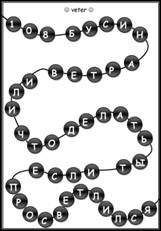Бхагаван Раджниш (Ошо) - Послания любви. 365 писем Ошо
But I am happy that you are dying
because this is the only way to be beyond death –
I say: the only way.
Remember this always.
Sekkyo once said to one of his monks:
Can you get hold of emptiness?
I will try, said the monk; and he cupped his hands in the air.
That is absurd, said Sekkyo.
You have not got anything in there.
Well, master, said the monk, please show me the right way.
Thereupon Sekkyo seized the monk’s nose and gave it a great yank.
Ouch! yelled the monk. You hurt me!
I cannot help it,
because that is the only way to get hold of emptiness!
said Sekkyo.
232. Love.
Man asks questions and then answers them himself.
Nothing is answered in this way.
But man is capable of deceiving himself –
and the whole of philosophy
is nothing but such a deception.
Man asks: What is mind?
And then answers himself: Not matter?
And then asks: What is matter?
And then answers: Not mind?
And this stupid game goes on.
I have heard about a distinguished philosopher
who always began his speeches with: Why are we here?
He had occasion to address the inmates
of a mental hospital
and ended with: Ladies and Gentlemen, why are we here?
One of the inmates called out:
We are all here because we are not all there!
233. Love.
The mind always thinks in terms of the self.
It is egocentric.
During the French revolution
a man from Paris stopped at a village
and was asked by a friend what was happening.
They are cutting off heads by the thousands,
said the visitor.
How terrible! cried the villager.
That could ruin my hat business!
But this is the way of the mind,
and because of this it is never in tune with the cosmos,
so how can it know life?
It cannot know it because it cannot be one with it.
Really with the mind there is no knowing
but only superficial acquaintance.
Intimate and deep knowing comes only with no-mind –
and meditation is the dissolving of mind into no-mind.
234. Love.
A monk asked Hyakujo Yekai:
What is the most miraculous event in the world?
Hyakujo said: I sit here all by myself!
235. Love.
Freedom from becoming means freedom for being.
Becoming is desiring,
being is that which is.
Becoming is longing for the future,
being is to be in the present.
Becoming is mental,
being is existential.
That is why becoming must cease for the being
to reveal itself.
Becoming is just like the smoke around the flame,
or just like the outer covering around the seed,
so please let the smoke go
for the flame to explode in its complete glory
and splendor,
and let the seed die to its outer shell
so that it may be what it is in its innermost depth.
236. Love.
No more principles are needed.
The world is already much too burdened with principles
and people who are men of principle.
I have heard that once a priest was consoling a widow.
He said with much feeling that her dead husband
was a man of principle.
That he was, sighed the widow.
Every Saturday night for these past twenty years
the poor man would come home
and faithfully hand me his pay envelope –
he never missed doing that.
Of course the envelope was always empty,
but mind you,
he was loyal to the principle of the thing.
237. Love.
Religion is – living without conflict,
that is, without ideas
and without ideals,
because whenever one lives with ideals
there is conflict,
there is conflict between
that which is and that which should be,
and then life is misery.
See this and go beyond.
In fact the very seeing of the fact is going beyond.
And please do not ask the seemingly inevitable, “How?”
Because there is no how to it.
Either you see it or you do not see it –
and moreover the how again creates conflict.
238. Love.
Bhakti needs only time to absorb the shock she
has come across
in her deep meditations;
remember – only time and nothing else.
The shock is nothing new.
It happens whenever the deeper layers of the unconscious
are encountered.
Before any mutation this is absolutely necessary.
Be grateful to the divine because this is a good omen.
Bhakti needed it badly,
and when she is out of it she will be a totally new person.
Soon she will be twice-born.
At present she is passing through a great spiritual crisis,
so you be with her – but just as if you are not.
Be present, but with absolute absence.
This is the only way you can be helpful to her.
Let her be alone as much as possible.
Do not talk with her
except where it is needed absolutely,
and then too be telegraphic.
But if she herself wants to talk
let her talk as much as she likes,
and you yourself just be a passive listener.
Let her do whatsoever she wants to do or not do
and soon everything will be okay.
Do not worry at all.
I will always be there beside you –
and if you can see, you will be able to see me also.
Of course Bhakti will feel my presenceand become aware
of me so many times in these days. Convey my blessings to her.
239. Love.
One day a man came to the Sufi teacher, Bahauddin.
He asked for help in his problems
and guidance on the path.
Bahauddin told him to abandon spiritual studies
and to leave his court at once.
A kind-hearted visitor began to remonstrate
with Bahauddin.
You shall have a demonstration, said the master.
At that moment a bird flew into the room
darting hither and thither,
not knowing where to go in order to escape.
The master waited until the bird settled
near the only open window
of the chamber and then suddenly clapped his hands.
Alarmed, the bird flew straight
through the opening of the window
to freedom.
To him that sound must have been something of a shock,
even an affront, do you not agree? said Bahauddin.
240. Love.
Fu Ta Shih says:
Each night one embraces a Buddha while sleeping,
each morning one gets up again with him.
Rising or sitting –
both watch and follow one another
Speaking or not speaking –
they are in the same place.
They never part even for a moment
but are like the body and its shadow.
If you wish to know the Buddha’s whereabouts,
in the sound of your own voice
there he is.
Do you understand this?
If not now – when will you understand?
And this is not being asked for the first time,
but many many times in many many lives
the same question has been raised –
and you have not yet answered!
Now, is it not time enough?
241. Love.
Mind is localization of consciousness,
and it can be localized in any part of the body.
Ordinarily we have localized it in the head,
but other cultures and other civilizations in the past
have tried other parts of the body also,
and on other planets
there are beings with other parts of their bodies
working as their minds.
But whatsoever the part chosen
localization of consciousness means its freezing,
and whenever it ceases to flow freely as is needed
it is no longer consciousness in its suchness.
Meditation means: consciousness in its suchness.
So let consciousness fill the whole body,
let it flow throughout the totality of your being
and you will have a feeling of aliveness
which is never known and felt
by localized consciousness.
Whenever there is localization of consciousness
the part in which the localization happens
becomes tense and diseased
and the remainder of the body becomes a dead weight.
But with meditative consciousness
or flowing consciousness
everything changes completely:
the whole body becomes alive, sensitive and aware
and consequently weightless.
Then there is no center at which
tensions can exist and accumulate:
they cannot exist without frozen blocks of consciousness.
The flowing, moving consciousness
washes them out constantly with every movement.
And when the whole body is alive
only then do you begin to feel
the cosmic consciousness all around you.
How can a frozen consciousness,
and that too surrounded by a dead body,
feel the cosmic?
242. Love.
Now man knows more about man than ever
and yet no problem is solved.
It seems that something is basically wrong
with our so-called knowledge itself.
This whole knowledge is derived from analysis,
and analysis is incapable of penetrating
the depths of consciousness.
The analytical method is all right for matter
or for things
because there is no inside to them,
but consciousness is insideness,
and to use the analytical method with consciousness
is to treat it as an object,
while it is not an object at all.
And it cannot be made an object;
its very nature is subjectivity,
its being is subjectivity,
so it must not be approached from outside
because then whatsoever is known about it is not about it.
Consciousness must be approached from inside –
and then the method is meditation and not analysis.
Meditation is synthetic:
it is concerned with the whole and not with the parts,
it is subjective and not objective,
it is irrational or super-rational and not rational,
it is religious or mystic and not scientific.
Authentic knowledge of consciousness
comes only through meditation and all else is
just superficial acquaintance
and basically erroneous
because the very source of it is fallacious and poisonous.
243. Love.
Life is a dream so enjoy it;
but do not ask for more because
then you only disturb the dream
and get nothing except a disturbed night.
Be a witness to the dreaming mind
and then there is transcendence:
then you go beyond dreaming and beyond mind itself.
And know well that there is an awakening
below the dreaming mind
which is nothing but just a disturbed dream.
One can get to this below-dreaming state of awakening
through asking for more, desiring more –
as ordinarily we all do.
In a dream Mulla Nasruddin saw himself
being counted out coins
and when there were nine silver pieces in his hand
the invisible donor stopped giving them.
Nasruddin shouted: I must have ten! so loudly
that he woke himself up.
Finding that all the money had disappeared
he closed his eyes again and murmured,
All right, then, give them back –
I will take the nine.
There is also an awakening above the dreaming mind –
the real awakening
in comparison to which man ordinarily is asleep.
One can reach this awakening
through witnessing the dreaming mind –
and unless one reaches it one is not really alive.
244. Love.
The divine is that from which one cannot depart,
and that from which one can depart is not the divine.
So find that from which you have never departed
and cannot ever depart from –
and then laugh at the absurdity of the human mind
and its efforts!
Buddha is still laughing because of that.
Listen!
245. Love.
Why does man suffer?
Man suffers because of his craving,
craving to possess that which cannot be possessed,
and craving to keep things forever with himself
which are essentially impermanent.
And chief among these things is his own ego,
his own persona.
But all things are impermanent.
Except for change itself
everything changes.
Really nothing is
because everything is only a process,
so as soon as one tries to possess anything it slips away.
The possessor himself is slipping away constantly!
Then there is frustration
and then there is suffering.
Know this well,
realize this well and there will be no suffering
because then you have unearthed the root.
246. Love.
The self can never be free –
because the self itself is the bondage.
This is the meaning of the penetrating saying of Jesus:
He that saveth his life shall lose it
and he that loseth his life shall know life abundant.
Or that of Lao Tzu in Tao-te-Ching:
He who humbles himself shall be saved,
he who bends shall be made straight,
and he who empties himself shall be filled.
One is not to make the self free;
rather on the contrary, one has to be free from the self.
The self is nothing but the husk of the seed.
Do not cling to it.
Sings Wu Ming Fu:
The seed that has to grow must lose itself as a seed,
and they that creep may be transformed
through the chrysalis to wings.
Wilt thou then, O mortal, cling to husks
which wrongly seem to you to be the self?
247. Love.
The gates of the temple are wide open
and it is only after thousands of years
that such opportunity comes to this earth.
Know well that they will not remain open forever.
The opportunity can be lost very easily,
and you are still wavering,
and you are still hesitating –
to enter or not to enter,
to be or not to be.
I know that the challenge is great, but I know also
that your being is completely ready to take the jump.
Hence my insistent call for you to come and enter.
And this is not for the first time that I have called you,
nor the first life;
I know you, Bhakti, through so many births!
And soon you will also remember many things.
But not before the jump.
Only your superficial persona is resisting, not you –
and it is expected to resist always
because the moment one takes the plunge
into the unknown
it has to die naturally.
So please do not identify yourself with it;




